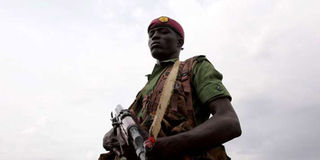US condemns South Sudan army's attacks on opposition site

A Sudan People's Liberation Army-in opposition (SPLA-io) soldier is seen at a containment site in the south Sudanese capital, Juba, on April 7, 2016. AFP PHOTO | CHARLES LOMODONG
What you need to know:
- South Sudan government forces attacked a site where opposition troops had assembled in accordance with a ceasefire agreement.
- Disputes should be settled through dialogue, the State Department said, observing: “There is no military solution to the conflicts in South Sudan.”
- South Sudan government leaders may regard US condemnation of SPLA actions as a serious matter
The United States said on Monday that it “condemns” attacks by South Sudan government forces on a site where opposition troops had assembled in accordance with a ceasefire agreement.
The recent operation by the Sudan People's Liberation Army (SPLA) destroyed the designated cantonment area, the State Department said. It did not offer an estimate of casualties.
This action is in clear violation of the permanent ceasefire provisions that apply nationwide and were agreed to by all peace agreement signatories,” added department deputy spokesman Mark Toner.
South Sudan government leaders may regard US condemnation of SPLA actions as a serious matter.
Washington ranks as by far the largest source of assistance to a country that came into being five years ago largely as a result of persistent US efforts to ensure a peaceful divorce of Khartoum and Juba.
But the US did take an even-handed approach in Monday's statement.
It condemned reported opposition attacks on SPLA forces and civilians in the same area. Such actions also constitute a violation of ceasefire provisions, the State Department said.
Spokesman Toner urged all combatants in South Sudan's civil war to provide access to a neutral monitoring unit tasked with investigating incidents of this kind.
Disputes should be settled through dialogue, the State Department said, observing: “There is no military solution to the conflicts in South Sudan.”




